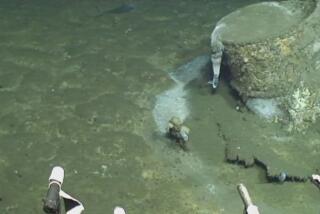Radiation found in seawater near Fukushima plant
- Share via
Radiation has been detected in seawater in areas surrounding the earthquake and tsunami-ravaged Fukushima nuclear plant in northeastern Japan, creating one more cause for concern after radiation was found in food items and tap water.
Officials stressed that the levels -- which they said would have minuscule impact on the human body even if the seawater were ingested daily over a year -- were not cause for alarm.
Tokyo Electric Power Company, which owns the plant, said it detected radioactive iodine-131 more than 125 times higher than the legal limit in a sample of ocean water found about 0.2 miles south of the Fukushima Daiichi plant on Monday, Kyodo News Agency reported. Government and power company officials said Tuesday it would test seawater at eight locations about 18 miles off the coast.
Photos: Unrelenting crisis grips Japan
By Tuesday morning, radiation levels at the same spot had fallen but seawater contaminated with radiation was detected in a wider area, in samples taken from as far as 10 miles south of the damaged plant, where efforts to cool the reactors have included dumping seawater on them.
Japan’s chief cabinet secretary Yukio Edano told reporters it was too early to know what the impact of radiation in seawater would be on seafood, Kyodo reported.
The news came as nations near and far tried to assess the potential reach of the radiation released from the troubled nuclear reactors.
South Korean media reported that seafood imports from Japan dropped amid consumer concerns about radiation contamination. Minuscule amounts of radioactive particles from Fukushima were detected in Iceland, Reuters news agency reported, citing a Vienna-based U.N. monitoring agency.
At the same time, one official at the International Atomic Energy Agency expressed concern about the flow of information from Japan.
“We have not received validated information for some time related to the containment integrity of Unit 1. So we are concerned that we do not know its exact status,” IAEA official Graham Andrew told reporters, according to Reuters.
Photos: Unrelenting crisis grips Japan
More to Read
Sign up for Essential California
The most important California stories and recommendations in your inbox every morning.
You may occasionally receive promotional content from the Los Angeles Times.














